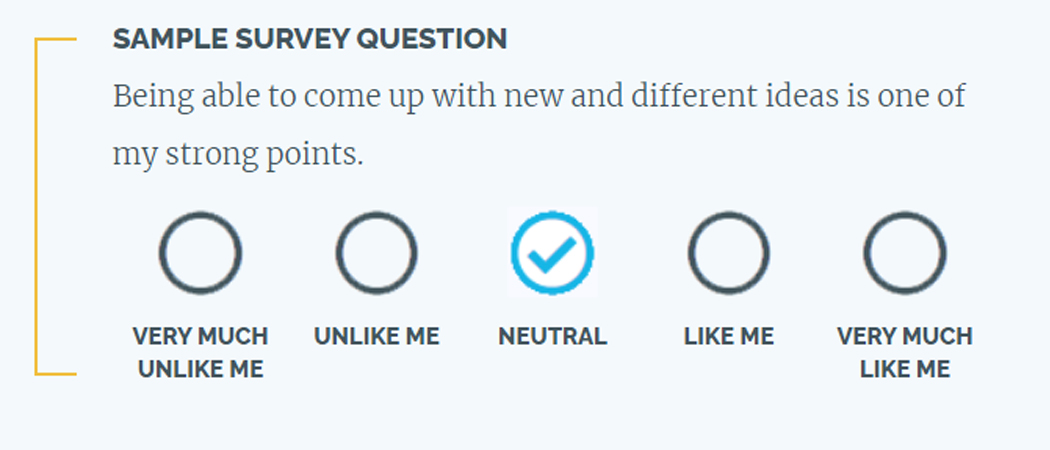Rather than just going through the motions…
can we employ our unique character strengths to help us thrive?
Considering the research, and our direct experience…YES!
Research has shown many positive benefits of using character strengths across physical, psychological, emotional, social, and spiritual domains. Character strengths have been linked with each of the main elements of well-being: positive emotions, engagement, meaning, positive relationships, and accomplishment.
Further to this, they’ve been linked to many other benefits that help people amplify the positive in their life. These benefits include higher levels of self-acceptance, autonomy, goal progress, physical health, resilience, and general mental fitness.
The latest research proves that helping people boost their strengths is more effective than focussing on correcting their deficits.
Time to discover your strengths
Take 10 minutes to accurately identify your unique set of character strengths by completing the VIA Character Strengths Survey the only FREE, scientific strengths measure (sample question below).

Using your personal strengths – 7 powerful outcomes
1. Strengths focussed goals
Character strengths can potentially play a big part in you achieving your goals!
However, a plan of action is always required to reach any form of goal. Making big audacious goals usually becomes overwhelming, which sets us up for failure. Avoid this outcome by skilfully planning to achieve small, connected, incremental goals, and the big goals can be achieved.
All too often we focus on planning the “what” (the tasks, the dates etc), and we forget the “who”. We forget to consider who we are, at our core. We don’t embrace the attributes we have that will help us achieve a goal, and which attributes may hinder us.
How does using your top character strengths support this process?
By identifying your top 3-5-character strengths, and by applying these strengths skilfully, you can achieve your desired goals.
2. Career build with character strengths
We often hear, ‘play to your strengths’ or ‘do something you love.
Workplaces can be particularly challenging, demanding, and stressful. Researchers have found that you are more likely to love your work life if you get to use your character strengths in your role.
What can you do about it?
1 Take time to learn how to use your top 3-5 character strengths at work. Eg: ‘Bravery’ – request a meeting with your manager to plan your career growth.
2 Create self-awareness around your top 3-5 strengths by identifying how you use them during a workday? Aim to use your character strengths daily and document your experiences. How did you use them? What was your experience?
3. Happy on strengths…
The following strategies are the most effective and well-known happiness boosters in positive psychology.
- Reflect each day – write down 3 things that went well and why they went well. Practicing gratitude encourages good acts and makes you feel great.
- Employ one of your top 5 strengths in a new way each day and feel greater energy.
- Diarise your gratitude towards others, read this to them or give it to them if you want.
- Practice mindfulness when walking, eating, listening, or breathing. Take a close-up photo of something of beauty each day and send it to a friend.
- Set goals that are consistent with your life values. Consider what strengths you can use to support these goals
- The firing you – think of a specific time when you were really feeling and operating at your best and feeling your authentic self. Write this story down and/or share this story with someone important in your life.
- Count or pay forward – perform little acts of kindness each day. Notice when other people extend kindness to you.
- Savouring the pleasurable experiences from each day for 2-3 minutes, will allow you to maximise their positive effect.
4. Character filled life-change
Take time to reflect on the defining moments in your life that positively changed your life trajectory.
Try the Defining Moments Exercise:
1 Defining moment – name one defining moment that has had a meaningful impact on you.
2 Character strengths – Which character strengths did you use in this situation?
3 Identity – how has this moment shaped who you are or contributed to your identity? How has it effected your view of yourself?
4 Courage, Wisdom, Humanity or other virtues – looking at the bigger picture, were you enacting virtues that helped you mobilise your strengths in that moment?
By increasing positive memory recall (savouring), you will enhance your self-perception and self-esteem.
5. Siri doesn’t know this
The key elements of meaning as discussed by philosophers, theologians, researchers, and other experts over the centuries include Coherence, Significance, and Purpose.
- Coherence – making sense of things or looking for patterns to make life more predictable. For example, as you look at the life you have lived so far, how do you make sense of the good things? Why have they occurred?
Using your strengths to build coherence:
Use the strength of perspective to help you step back and take in the wider view of your life, so you don’t get lost in details and stressors. Judgment can be employed to analyse your beliefs about the world and the people in it and curiosity to question and explore your life meaning.
- Significance – feeling that you matter and that life matters. It means to not only sense and know the value of your life but to feel that appreciation for yourself, others, and the world in a deep way.
Using your strengths to build significance:
You may have previously turned to your heart-based character strengths of love, gratitude, kindness, and forgiveness. Acknowledge and consider the importance of your character strengths throughout your life (past, present, future).
- Purpose – having important life goals and working to achieve them.
Using your strengths to build purpose:
Considering one of your most meaningful life goals, which strengths will be the pathway to these goals? For example, perhaps kindness is your pathway to your goal of being more charitable or perseverance is your key pathway to that professional qualification.
How can you use your character strengths for the highest good?
6. Tune in to your strengths
When you understand your unique set of character strengths you can start to really tune in to how you can make a difference through finding your true, value driven, calling.
Creativity – the world may need your ideas (Curiosity), your strategies (Judgment), your best coping (Perseverance) tools.
Love of learning – the world needs you to keep learning and growing in new ways, so you can pass on this knowledge and feel good about contributing.
Perspective – the world needs your sound advice, a glimpse of the bigger picture amidst the scary details.
Bravery – the world needs your bravery—the courage to help someone you’ve never helped, the courage to dust off the strengths you’ve allowed to erode.
Character strengths are critical right now in this world. They are not a trivial thing, they are tough-loaded, resilience-based, and crucial at times of adversity.
7. Parenting the strengths
What is the “strengths reality” you have been potentially missing? Understanding a child’s character strengths (strengths-based parenting) can empower you to consciously reframe situations and behaviours so a new, positive perspective can be established. This is a highly effective approach when you inevitably experience stress as a parent (or teacher).
Reframing situations can be as simple as asking yourself: Is there another way I might look at this situation, in the context of character strengths?
Flipping your perception – Sometimes this effective reframing simply involves replacing one word in your thought process. A stubborn child becomes a perseverant child. Your distractible son (male student) becomes your highly curious son. Your wild and hyperactive daughter (female student) becomes your zestful daughter.
So…put on your strengths goggles and take a fresh look at the situation. What character strengths is your child imperfectly using?
Be careful to not narrow your attention when you get upset or anxious as this can cause us to miss a substantial portion of reality.
Just remember
Signature strengths (Top 3-5 strengths) are an individual’s strongest or most prominent character strengths. Ultimately, these are the strengths that you need to be aware of in yourself and others.
Three key features of signature strengths (3 E’s) are:
Essential: the strength feels essential to who a person is. Effortless: when enacted, the behaviour associated with these strengths feels natural and effortless. Energizing: using the strength uplifts you and leaves you feeling happy and ready to take on more.
We must be careful to notice our own, and other people’s, best strengths so we can find ways to let them loose in our lives.
Where to from here?
At Get Mentally Fit, many of our programs and services are directly informed by the fundamental concepts of positive psychology, including character strengths. Join our community, via our socials or mailing list at the bottom of this page, to receive more mental fitness tips.
Contact us to enquire into how we can support you to reliably measure, and skilfully enhance, your current mental fitness.


